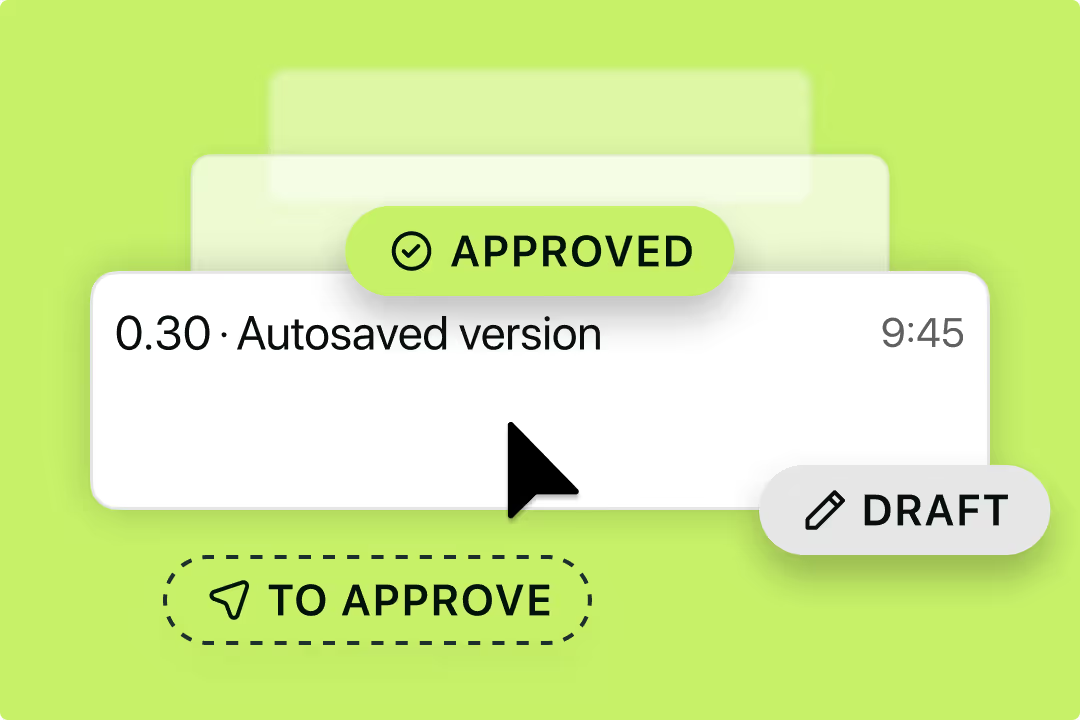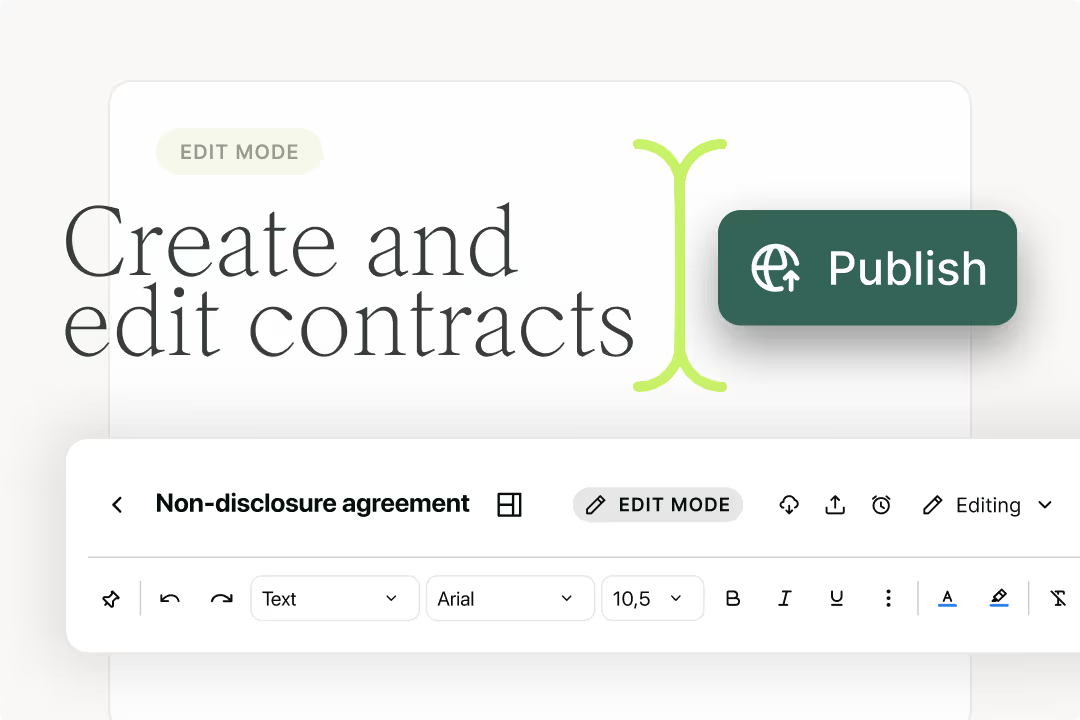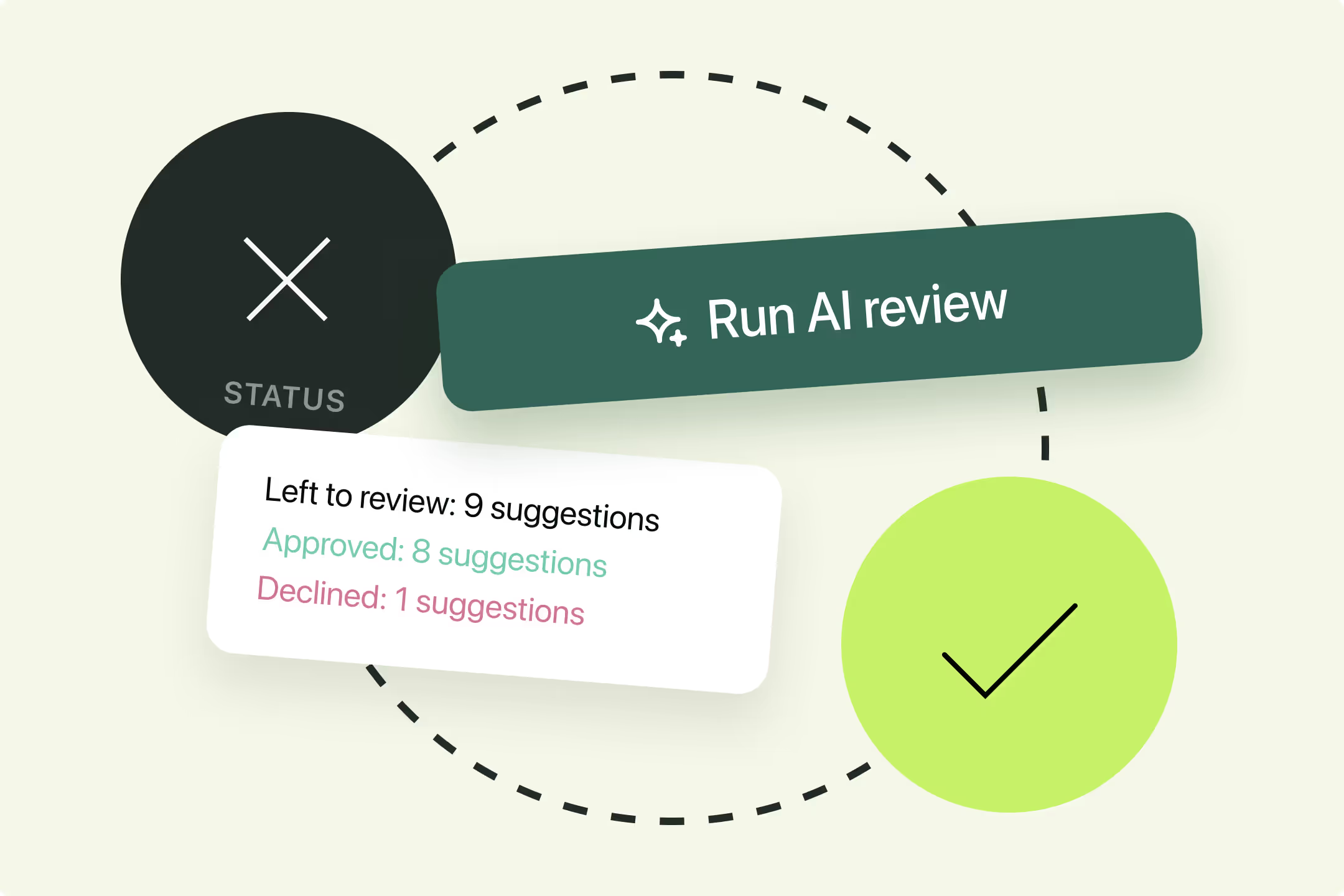Solutions
Customer Support
Resources
Signing contracts is a moment for celebration, and drafting contracts is easy to automate with the right software in place.
But the process of collaborating on contracts - with legal, commercial and other teams working together to get deals over the line - can be painful.
To turn the tide and change this trend, businesses need to move away from manual, fragmented contract processes and towards more collaborative contract workflows. Contract collaboration software enables teams to do just that.
Contract collaboration software is a tool that enables multiple parties to work together on a contract in one platform, in real-time.
It achieves this by enabling teams to comment on, redline, approve, sign, share, and track contracts in a shared workspace, rather than working in silos across different versions of a contract and in different tools.

Contract collaboration software is also known as contract management software. However, many legacy contract solutions like DocuSign CLM and Ironclad won’t be collaborative enough for teams in 2026. Instead, businesses should look for platforms that prioritize seamless collaboration between teams, like Juro.
To find out more about how Juro’s contract management software enables teams to move faster by streamlining collaboration between legal and business teams, hit the button below. Otherwise, keep reading to find out how impactful contract collaboration software could be for your business.

Contract collaboration software works by providing one unified workspace for teams to work together on contracts at every stage of the contract lifecycle. This workspace is comprised of various features, and we'll explore each of these now.
Browser-based contract editors are great for streamlining contract collaboration because they enable teams to draft, edit, review, and amend contracts simultaneously, rather than working on separate, static versions of a legal document in an editor like Microsoft Word.
Juro’s editor presence feature also provides visibility into who is viewing, editing, or working on a contract at any one time. This makes it easier to discuss the contract and its contents and understand which parts of a contract are capturing their attention.

Contract collaboration isn’t just about working on a contract at the same time. It’s also about how legal can empower other teams to self-serve on contracts, and automated contract templates are a great way to do this.
Automated contract templates make it quick and easy for teams to generate contracts, rather than them needing to draft each one from scratch.
Instead, commercial teams can populate the contract templates by answering a series of simple questions, or by pulling the data into the contract automatically via integrations with other business systems.
Conditional logic is another useful contract collaboration software feature because it enables legal teams to retain control over what goes into business contracts without them having to oversee the entire process.
Instead, conditional logic enables teams to set certain rules in the contracts, and these determine if and when clauses are added, removed or varied depending on the information contained within the contract’s smartfields. This functionality empowers commercial teams to self-serve on contracts whilst minimizing contractual risk.
Browser-based redlining and commenting enable teams to streamline the contract negotiation process and get contracts agreed faster by bringing parties into one workspace.
In a manual workflow, contracts jump between tools and parties during negotiations with new versions created and shared. In Juro, users can drag and drop comments, redline contracts and discuss terms using comment threads. Juro users can also toggle between internal and external views to hide certain contracts from counterparties and review contracts privately with their teams.

Approval workflows are another useful feature to look for in a contract collaboration tool. This is because higher-value, more complex contracts often require another stakeholder’s approval before they can progress to signing, and without the right processes in place, getting this approval can be painful.
Fortunately, collaborative contract software like Juro enables teams to automate and customize their approval workflows, enabling them to move contracts along faster.

Contracting parties will need to sign the contract before it can become effective and legally binding. Traditionally, these signatures were created in wet ink and on physical copies of a contract. However, businesses often use electronic signatures now, making it quicker and easier for parties to open, sign and share contracts than ever before.
It’s particularly useful to find a contract collaboration platform with mass-signing functionality. This is because the feature enables stakeholders to sign hundreds of contracts in one click, allowing them to unblock multiple teams and projects in a matter of seconds.
It’s also important for contract collaboration tools to provide visibility into the changes made to a contract throughout its lifecycle. This data is often displayed in detailed audit trails and timelines, making it easy to track who makes which edits to a contract, and how it’s progressing.
Features like this make it easier to collaborate with internal teams and counterparties on contracts because they make it easier to track interactions with the document and understand who might be blocking a contract.
Centralized contract storage is another useful tool for contract collaboration. This is because it makes contracts more accessible for contract stakeholders and ensures that teams are always working on the correct version of a contract.
It’s also worth looking for a platform that makes all of your contracts fully searchable. For example, Juro users can leverage contract metadata and OCR technology to query, filter and organize their contracts in seconds, with no manual data entry required. This provides you with table views of your contracts that can be shared quickly and easily with other members of your team.

Most contract repositories will also have granular access controls so you can decide who has access to which contracts, and what level of access they have. This is a crucial feature for contract collaboration software since it protects the confidentiality of certain contracts and minimizes contractual risk.
Automated contract reminders help teams to keep eachother in the loop about contracts without having to inform them about the status of an agreement or the action required manually.
For example, Juro users can set automated signing reminders that prompt counterparties and internal teams to sign contracts faster. They can also set contract renewal reminders to ensure they don’t miss any upcoming deadlines.
These reminders are fully customizable, meaning that they can be sent to multiple people and in specific orders.
Without contract collaboration software, individuals would need to track contract dates in a contract management spreadsheet of some sort, and it’s not always clear who is responsible for certain tasks.
Contract collaboration software can transform the way your business manages contracts, making your contract workflows faster and more efficient. Let’s explore how businesses like yours are already benefiting from Juro’s collaborative contract management software.
One of the biggest benefits of contract collaboration software is that it allows for faster contract workflows, and often faster sales cycles and hiring cycles as a result. This is because it automates many of the processes involved in contract drafting, negotiation, and signing.
Another benefit of contract collaboration software is that it provides more visibility into contracts. This is achieved by centralizing all contract data in one place, which can be accessed by all relevant parties. This allows teams to track contract progress, monitor key dates, and quickly access critical information when needed.
Contract collaboration software also helps reduce manual contract admin by automating many of the repetitive tasks involved in contract management. This can include everything from contract drafting to post-signature contract management tasks like data entry and contract monitoring.
{{quote1}}
Enhanced security is another benefit of contract collaboration software. This is achieved through a range of security features, such as secure cloud-based contract storage, encryption, and granular access controls.
This ensures that sensitive contract data is protected at all times, reducing the risk of data breaches or unauthorized access while also making contracts easy to find and access for the parties with permission.
Contract collaboration software can also improve the overall counterparty experience. This is because it simplifies and streamlines the contract negotiation process, making it easier for both parties to collaborate on contracts and removing friction from the workflow for all stakeholders.
This, in turn, can lead to better relationships with suppliers and customers, as well as increased business efficiency and profitability.
If your business is suffering uncollaborative, fragmented contract workflows, Juro can help. Juro’s all-in-one platform enables teams to create, execute and manage contracts in one unified workspace. To find out more, fill in the form below.
Lorem ipsum dolor sit amet, consectetur adipiscing elit. Suspendisse varius enim in eros elementum tristique. Duis cursus, mi quis viverra ornare, eros dolor interdum nulla, ut commodo diam libero vitae erat. Aenean faucibus nibh et justo cursus id rutrum lorem imperdiet. Nunc ut sem vitae risus tristique posuere.

